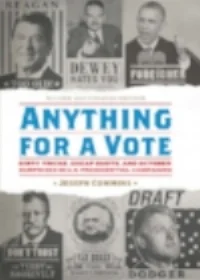As a young ladies maid who can’t yet vote, Jane Prescott doesn’t take a huge interest in national politics. (Local and domestic politics are a different story.) But writing a mystery set in the late Gilded Age, I wanted some sense of what was happening in Washington at the time. So I talked to Joseph Cummins, author of Anything For a Vote: Dirty Tricks, Cheap Shots, and October Surprises in U.S. Presidential Campaigns.
Me: A Death of No Importance takes place in 1910. So the most recent election was 1908 Taft vs. Bryan. Would it be right to say that this wasn't one of our more thrilling political battles?
Joseph Cummins: In 1904, on the very eve of his election win against Alton Parker—yes, one of the most boring presidential candidates in American history—Teddy Roosevelt made the cardinal error of his political life, saying that he would not run for another elected term as president. Roosevelt disliked his own veep, Charles W. Fairbanks, so he decided to throw his weight behind his friend, Secretary of War William Howard Taft. Taft was a very capable guy, having held numerous high-level positions, including governor of the Philippines, but he was also sort of a dufus. There was a joke that Taft’s name was an acronym for Takes Advice From Teddy—and Taft did visit Roosevelt throughout the campaign for advice. In the election of 1908, Taft weighed 330 pounds; since his running mate, “Sunny” Jim Sherman weighed 200, they may have been pound for pound the heaviest ticket in presidential history. But yes, the election was pretty boring. 1912 on the other hand…
1908 was Bryan's third try. Couldn't the Democrats get anyone else?
Since Teddy was enormously popular, his man Taft was, too. The Dems threw the old warhorse Bryan out there for lack of anyone better to waste against a sure thing like Taft; however, though Taft won the electoral college by a wide margin, he only garnered 51.6 percent of the popular vote.
Who was a Republican? Who was a Democrat? And what about those Progressives?
In 1912, traditional conservative Republicans were led by Taft and they were much like the Republicans of, say, the 1950s, especially in the support of the economic game-changer of the time, which was the emergence of the corporations, what reformers called “trusts,” where economic power was concentrated in railway and oil barons and Wall Street financial interests in an unprecedented way. Americans weren’t used to it; Progressives saw it as a threat not only to economic balance in the country, but to the very heart of the democratic American way of life. They were certain (with some reason) that these trusts corrupted leaders in government. 1893-1897 had seen a terrible depression where 15,000 small businesses went under, four million people lost their jobs, bands of homeless people wandered the country, seeking work, and people marched on Washington in protest. (Socialism would reach its ascendency in 1912 with the independent candidacy of Eugene Debs.)
In 1912 the Republicans had held the White House, with the exception of Grover Cleveland’s two non-consecutive terms, for an astonishing 44 years. This is the longest time a major American party has been in power; which means the Democrats were the ones out of power. When Teddy Roosevelt chose to buck the party system and run against Taft, his Progressive, or “Bull Moose” party (so-named because Roosevelt declared himself “fit as a Bull Moose”) drew a lot of dissatisfied Dems — a really interesting assortment of socialists, reformers, Christians who believed in social action, and advocacy groups, particularly of women. Their champions included the journalist Jane Addams and the writer William Allen White. They wanted to create a minimum wage and cap working hours, oversee financial markets, even enact a national health insurance. Sounds like the Democratic party of the New Deal and the 1960s, right?
But the actual Dems in 1912, were more conservative than these Progressives. They ran with the academic and rather dry Woodrow Wilson. The reason Wilson won was, of course, that Roosevelt’s move split the Republican party and handed Wilson the vote, which meant that Wilson actually won with only 41 percent of the popular vote.
We think politics is ugly now, but they talked a lot of smack in the Gilded Age. Nastiest political insult?
Yes, it was nasty. Roosevelt in particular. Although less crude, and of course different politically than Trump, TR was similar in his highly personal way of attacking his opponents. He called the admittedly dull Alton Parker “that neutral tinted individual.” And when he turned on Taft, he called him “a fathead with the brains of a guinea pig” and “a rat in a corner.”
When rumors came out that Wilson may have been having an affair, Roosevelt remarked: “You can’t cast a man as Romeo who looks and acts so much like an apothecary clerk.”
And he famously advised the portly Taft’s handlers never to let him be seen on a horse: “Dangerous for him and cruelty to the animal.”
